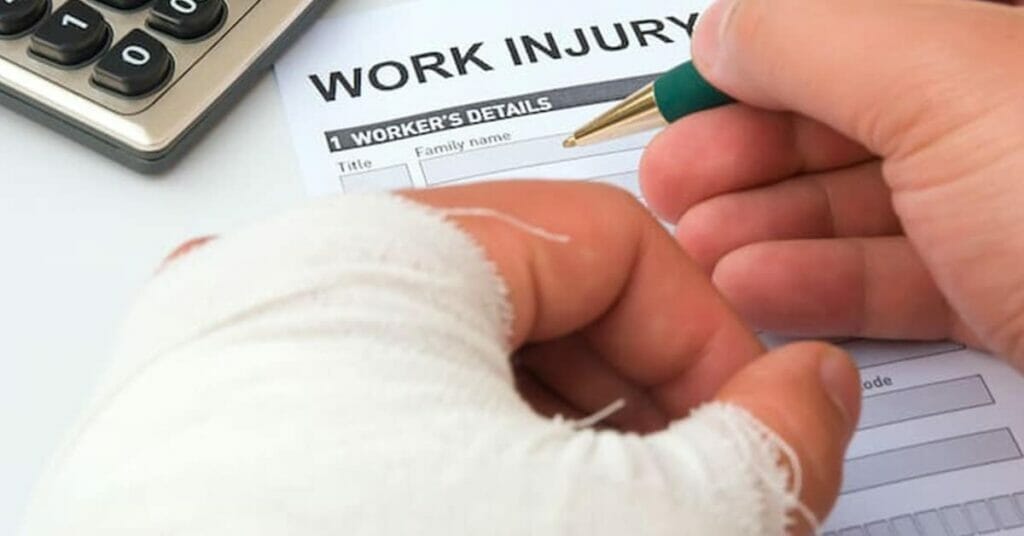Facing a car accident on the job that wasn't your fault? Wondering about the steps to take and potential claims? Work-related accidents can be a challenging and confusing experience, especially when they involve a car accident that wasn't your fault.
In such situations, it's essential to be aware of your rights and understand the options available to you.
If you've sustained injuries in a car accident while working, whether as a driver or a passenger, it's important to recognize that you may have the opportunity to pursue two separate claims: one for workers' compensation and the other for a personal injury claim.
To help you navigate this complex territory effectively we'll delve deeper into the details of these claims.


If you find yourself injured while on the job in a car-related accident and it wasn't your fault, it's highly advisable to file a workers' compensation claim. However, let's explore why this step is crucial and what it entails:
1. Understanding Workers' Compensation:
Workers' compensation is a type of insurance that offers assistance to workers who experience injuries or illnesses directly related to their job duties. It's designed to cover medical expenses, lost wages, and rehabilitation costs resulting from such incidents. When it comes to car accidents that occur while you're working, whether you're driving for work purposes or simply a passenger, workers' compensation can come into play.
2. Two Potential Claims:
In the context of a work-related car accident, there are essentially two claims you may be eligible to file. First, there's the workers' compensation claim, which focuses on providing financial support for your injuries and recovery. Second, there's the car wreck claim, which addresses the specifics of the accident itself and any negligence involved.
3. The Complexity of Workman's Comp Claims:
While it might seem straightforward to file a workers' compensation claim, the reality is often more complex. Employers and their insurance providers may not always readily accept such claims, especially if they believe the accident occurred outside the scope of employment. Therefore, it's essential to have a clear understanding of when you're eligible to file and how to navigate potential obstacles.


Tennessee workers' compensation law adheres to the "coming and going rule," which generally states that accidents that happen during your commute to and from work aren't considered part of performing your job. To successfully claim workers' comp, you must demonstrate that the accident occurred during the scope of your employment and within regular work hours.
While the "coming and going rule" serves as the default standard, there are exceptions that can make you eligible for workers' compensation benefits following a car accident during your commute:
1. Company-Owned Vehicle: If you're driving a company-owned vehicle to and from work and an accident occurs, you may be covered under workers' comp.
2. On Work Premises: Accidents that happen on your employer's premises, such as parking lot collisions, might qualify for workers' compensation.
3. Traveling Salespeople: If your job involves traveling to see clients or customers, you could be eligible for workers' comp if an accident occurs during your travels.
4. Multiple Job Sites: If you travel to various job sites or offices during your workday and an accident takes place during your commute, workers' comp might apply.
5. Work-Related Travel: If you're injured while traveling for work or during an overnight trip, you may be eligible for workers' compensation benefits.
6. Company Functions: Accidents that occur while commuting to or from company events, such as retreats or team-building activities, could potentially qualify for workers' comp.
7. Errands for the Employer: If you're running an errand for your employer during your commute and an accident happens, you may be eligible for workers' comp benefits.
It's worth noting that employees who use their personal vehicles for work purposes, such as truck drivers, cab drivers, bus drivers, and delivery drivers, should generally be covered under Tennessee's workers' compensation laws if they're injured in an accident.
Understanding Personal Injury Claims:
In addition to workers' compensation, you may also have the option to file a personal injury claim if you were injured in a car accident while commuting to or from work. Personal injury claims serve a different purpose and cover various types of car accidents.
While both workers' compensation and personal injury claims aim to provide compensation for injuries, there are significant differences between the two:
1. Fault/Liability: In workers' comp claims, a fault is not a determining factor. You can receive benefits even if you were at fault for the accident. In personal injury claims, you must prove that the other party's negligence caused the accident and your injuries.
2. Medical Bills: Both workers' comp and personal injury claims should cover your medical expenses, including ambulance services, ER care, surgeries, hospitalizations, doctor visits, physical therapy, and assistive devices.
3. Lost Income and Benefits: Workers' comp provides temporary disability benefits when you can't work and permanent disability benefits if your disability meets specific criteria. Typically, the wage payment is two-thirds of your average weekly wages during the eligible period. In personal injury cases, the defendants should compensate you for 100% of your lost income while you're unable to work.
4. Pain and Suffering: Workers' comp claims do not include compensation for pain and suffering. However, personal injury claims allow you to seek compensation for physical pain and emotional suffering, including the psychological toll of the accident.
5. Eligibility: Only employees can file workers' compensation claims. Workers are not permitted to initiate personal injury lawsuits against their employers. However, employees can file third-party claims against non-employers, such as manufacturers of defective car parts, if the defect caused their injuries in vehicle accidents and more.
In conclusion, if you've been injured in a car accident while on the job, it's vital to have a comprehensive understanding of your rights and options. Filing a workers' compensation claim is a crucial step, especially if the accident occurred within the scope of your employment.
Additionally, you may have the opportunity to pursue a personal injury claim if the accident was not your fault. To ensure you receive the compensation you deserve and to navigate these intricate processes effectively, it's wise to seek legal guidance.
If you have questions or need assistance with a workers' compensation or personal injury claim related to a car accident on the job, do not hesitate to contact The Mike Hostilo Law Firm. Our experienced team is here to help you with all types of cases, ensuring your rights are protected and you receive the compensation you deserve. Your well-being is our priority. Contact us today for a free consultation.
Remember, you don't have to navigate the complexities of these claims alone. We're here to support you every step of the way.
33 Park of Commerce Blvd
Savannah, GA 31405
(844) 203-9338
contactus@hostilolaw.com
https://mikehostilolawfirm.com/cms/



